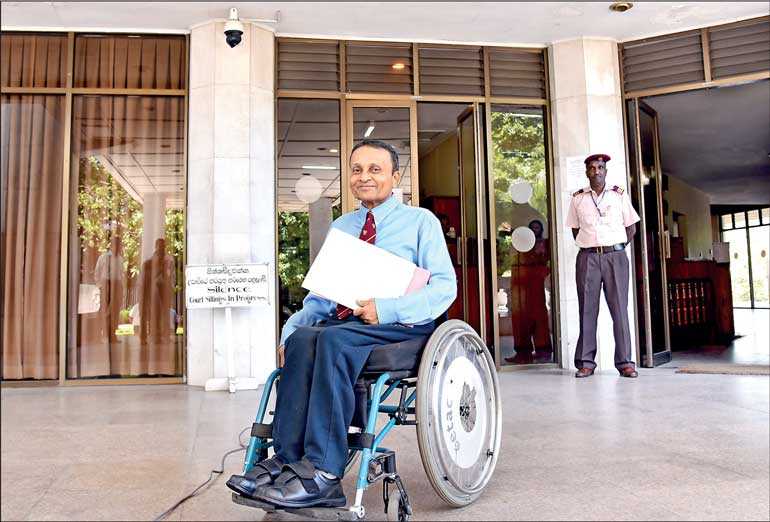Saturday Feb 14, 2026
Saturday Feb 14, 2026
Wednesday, 22 May 2019 00:00 - - {{hitsCtrl.values.hits}}

The Supreme Court of Sri Lanka, after hearing submissions and arguments on a nationally and internationally important public interest Fundamental Rights Application No. SCFR 273/2018, gave a landmark Order on 18 April 2019.
It was successfully pursued singlehandedly by this writer – since 2009 appearing at all times in person seated on a wheelchair.
Main concerns
The Supreme Court Judge bench comprising Justices Prasanna Jayawardana PC, Vijith Malalgoda PC, and Murdu Fernando PC concluded: In spite of (i). A comprehensive set of Regulations – made under the enacted Act No: 28 of 1996 – that are easily understood and unanimously approved by Parliament (in 2007 March) and (ii). Reinforced by an Order given under SCFR 221/2009 to over 70 respondents by the SC on 27 April 2011, and (iii) Ratifying the UN Convention for the Protection of the Rights of the Disabled – a legally binding agreement – on 8 February 2016, and (iv). Since 1996, the State’s duty and obligation to protect, promote and advance their rights, still, “Meaningful implementation of these Accessibility Laws by the State and the private sector – even at numerous new buildings people need daily – beyond doubt, is a continual failure and thereby safe access and their use by the country’s largest minority – people with restricted mobility”.
In a 28-page-long judgement SC clearly states: “The stark truth is, there is large scale and substantial non-compliance of new constructions with and non-enforcement of the act and Accessibility Regulations, despite the passage of 13 years and continual failure by the State in compliance. The photographs and other documents submitted to SC by the petitioner [i.e. this writer] support these SC conclusions.”
Ruled as the institutions that have continually violated the Fundamental Rights of disabled persons are those institutions coming under the purview of the Minister of Provincial Councils, Local Government and Sports, Minister of Social Services and Social Welfare, Minister of Megapolis and Western Development, Minister of Housing and Construction, Minister of Education, Minister of Justice and Prison Reform along with Sri Lanka Tourism Development Authority and the Urban Development Authority.
COC dilemma
In both rulings given by the SC on 27 April 2011 and again on 18 April 2019, it is adequately emphasised that Certificates of Conformity (COC) cannot and shall not be issued by a relevant authority unless and until all parts of the concerned completed construction (i) Have been physically inspected by that relevant authority recognised under Clause 10, and (ii) He clearly testifies that (iii). Construction comply in full with the provisions the Accessibility Regulations and the SC order.
If these directions had been adhered to in reality, there would not have been any reason for us to file fresh action and furthermore our FR could not have been violated continually to such a great extent.
The most effective feasible way to arrest this national tragedy in minimising the gap between the laws and ground realty, is that:
“No Court of Law can and shall recognise as a legally valid document any Certificate of Conformity issued since 18 April 2018 by an authority concerning any building or part of a building stated under the above Accessibility Regulations, if obtained circumventing country’s apex Court rulings.”
Violators, still, go free
SC also has recognised new facilities at several reputed hotels, shopping complexes and hospitals – toilets, washrooms and counters in particular – still, do not comply with SC orders and thereby pose numerous unwanted hardship to most clients/patients.
The real tragedy is that, yet, they fail to recognise opening doors equallly to all is untapped lucrative businesses.
SC states: “Despite 13 years have elapsed since Access Regulations were made, compliance hereby the Sri Lanka Railway and Sri Lanka Transport Board is only work in the pipeline.”
We believe, the envisaged Light Rail Transit system shall comply with these Court Orders for optimum benefit of all.
It is equally important to note that many new Court houses fail to comply with SC rulings and Accessibility Regulations. All High Courts and Magistrate Courts remain user-unfriendly and pose a potential threat to safety for increasing numbers of people with restricted mobility – wheelchair users in particular.
Trapped towards isolation? Yes, everyone?
Most of us never thought that, in a blink of an eye, our ability to attend to the usual daily necessities would be taken from us.
At this time, not less than an estimated 20% of Sri Lanka’s population – i.e. four million people – face impediments to their physical mobility, stability, dexterity or eyesight to remain the most vulnerable, voiceless yet the largest minority group.
This means one in every five people of Sri Lanka has to deal with limitations in ability in day-to-day living in an undesirable built social environment explained above.
This includes those over 65 years (almost a sixth of our population), people living with numerous debilitating medical conditions, those convalescing, those who use wheelchairs and sticks, and the pregnant. Look at the tormenting consequences that await you. You will soon realise that the world around once you knew to be cheerful and kind, is no more so, as you are often marginalised beyond expectations and unwantedly depending on others.
Hence, it is everyone’s, duty – yours too – to arrest soonest this national disaster.
Tormenting consequences awaiting you.
(i). Danger of injury and potential threats to safety to life (ii). Waste productive human potential (iii). Drive towards poverty and as SC concluded (iv). “Denial of opportunity of equality and the protection assured by the provisions of this Act and thereby continual violation of the Fundamental Rights guaranteed by Article 12(1) and Article 14(1)(h) of the Constitution, to the Petitioner Dr. Perera and others similarly circumstanced with restricted ability/mobility.”
(v). Every one of us, is certain to spend some time – long or short - living with limitations in ability – physical, sensory and intellectual.
The trauma of exclusion by built environments precipitate despair, depression, grief and phobia with the enhanced possibility of psychosomatic illnesses, potentially crippling precious human life – economically, socially and mentally.
(vi). The long term mega-development projects are inextricably entwined with the future of future generations of Sri Lankans. With this on-going adverse trend the next generation of persons suffering from mobility impediments – much larger than at present – will face far worsening consequences.
SC remedial measures
In addition to the directions given by the SC in 2011 under SCFR 221/2009 to the Chief Ministers and the Chief Secretaries of the Nine Provinces, the Supreme Court on 18 April 2019, again, issued several directions to six ministries, their secretaries and two Government authorities mentioned earlier to take immediate effective measures to ensure the design and construction of all parts of new buildings, facilities and services the public needs to use – as defined in Clause 10 of the Accessibility Regulations – must be completed enabling easy and safe access and use by persons with restricted mobility.
On 17 June 2013 SC ordered the Attorney General to ensure Orders given by the SC are given full effect by directing the authorities to take immediate steps to sensitise the private sector to the need to take cognisance of SC orders and to take appropriate steps in compliance.
The AG is the principal legal officer of this country and as the protector of the public pights of the public, if and when he also fails continually to comply with SC orders, it sets a very bad example to all others.
The new building complex of the AG and Kochchikade Church undergoing renovations shall be the acid tests for the State in moving towards an accessible Sri Lanka for all, a reality.
Punishable serious offence
SC states: “The specific provisions of the Act to punish the violators, although in force for 23 years, have never been used.”
No wonder the Violators of the law go away free and, thereby continue to violate the law and victimised parties – that includes the country – get severely punished incurring big losers that can never be compensated by money.
During the proceedings this Petitioner and the Attorney General both prayed that the State must amend the Clause 34(e) of the ACT made 23 years ago, to make offences look serious and make punishments effective enough to deter violations. SC hence, has to rule again that: immediate compliance is mandatory, to design buildings, to approve building plans, to certify completed buildings and to issue ‘Certificate of Conformity’ and directed to file legal action against any public officers/authorities/bodies/respondent(s) which breach/violate/fail to comply fully with these SC orders.
Popular myth
Implementation of accessibility measures and SC orders for new buildings are not costly as 85% work is just masonry. It requires no allocations of additional funds.
There are several low cost measures to significantly improve safety and accessibility. The colossal wastes to the country and human life caused by the failures to implement SC orders, is huge compared to the money needed.
The immediate crucial task is to create the widest possible awareness of these SC Orders to hasten implementation.
We appeal to socially responsible members of society, media, organisations and individuals to help us for the benefit of everyone, empowering humanity with dignified lives.
[The writer ([email protected]) – a paraplegic since 1992 – is a professional and a former senior manager in industry. Personal adversity has turned him into the pioneer voluntary accessibility rights activist and an internationally-recognised and a competent advisor on accessibility – trained even in England – with over 21 years of widest practical experience. See: goo.gl/tZZsmz]